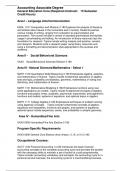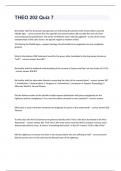Accounting Associate Degree
General Education Core (Required minimum: 15 Semester
Credit Hours)
Area I - Language Arts/Communication
ENGL 1101 Composition and Rhetoric 3 180 Explores the analysis of literature
and articles about issues in the humanities and in society. Students practice
various modes of writing, ranging from exposition to argumentation and
persuasion. The course includes a review of standard grammatical and stylistic
usage in proofreading and editing. An introduction to library resources lays the
foundation for research. Topics include writing analysis and practice, revision,
and research. Students write a research paper using library resources and
using a formatting and documentation style appropriate to the purpose and
audience.
Area II - Social/Behavioral Sciences
XXXX Social/Behavioral Sciences Elective 3 180
Area III - Natural Sciences/Mathematics - Select 1
MATH 1100 Quantitative Skills/Reasoning 3 180 Emphasizes algebra, statistics,
and mathematics of finance. Topics include fundamental operations of algebra,
sets and logic, probability and statistics, geometry, mathematics of voting and
districting, and mathematics of finance.
MATH 1101 Mathematical Modeling 3 180 Emphasizes functions using real-
world applications as models. Topics include fundamental concepts of algebra;
functions and graphs; linear, quadratic, polynomial, exponential, and logarithmic
functions and models; systems of equations; and optional topics in algebra.
MATH 1111 College Algebra 3 180 Emphasizes techniques of problem solving
using algebraic concepts. Topics include fundamental concepts of algebra,
equations and inequalities, functions and graphs, and systems of equations;
optional topics include sequences, series, and probability or analytic geometry.
Area IV - Humanities/Fine Arts
XXXX 0000 Humanities/Fine Arts Elective 3 180
Program-Specific Requirements
XXXX 0000 General Core Elective (from Areas I, II, III, or IV) 3 180
Occupational Courses:
ACCT 1100 Financial Accounting I 4 240 Introduces the basic financial
accounting concepts of the complete accounting cycle and provides the student
with the necessary skills to maintain a set of books for a sole proprietorship.
Topics include: accounting vocabulary and concepts, the accounting cycle for a
personal service business, the accounting cycle for a merchandising business,
,inventory, cash control and receivables. Laboratory work demonstrates theory
presented in class.
BUSN 1440 Document Production 4 240 Reinforces the touch system of
keyboarding placing emphasis on correct techniques with adequate speed and
accuracy and producing properly formatted business documents. Topics
include: reinforcing correct keyboarding technique, building speed and
accuracy, formatting business documents, language arts, proofreading, and
work area management.
COMP 1000 Introduction to Computers 3 180 Introduces the fundamental
concepts, terminology, and operations necessary to use computers. Emphasis
is placed on basic functions and familiarity with computer use. Topics include an
introduction to computer terminology, the Windows environment, Internet and
email, word processing software, spreadsheet software, database software, and
presentation software.
ACCT 1105 Financial Accounting II 4 240 Introduces the intermediate financial
accounting concepts that provide the student with the necessary skills to
maintain a set of books for a partnership and corporation. Topics include: Fixed
and Intangible Assets, Current and Long-Term Liabilities (Notes Payable),
Payroll, Accounting for a Partnership, Accounting for a Corporation, Statement
of Cash Flows, and Financial Statement Analysis, Laboratory work
demonstrates theory presented in class.
ACCT 1110 Managerial Accounting 3 180 Emphasizes the interpretation of data
by management in planning and controlling business activities. Topics include
Managerial Accounting Concepts, Manufacturing Accounting using a Job Order
Cost System, Manufacturing Accounting using a Process Cost System, Cost
Behavior and Cost-Volume-Profit, Budgeting and Standard Cost Accounting,
Flexible Budgets, Standard Costs and Variances, and Capital Investment
Analysis and Budgeting. Laboratory work demonstrates theory presented in
class.
ACCT 1115 Computerized Accounting 3 180 Emphasizes operation of
computerized accounting systems from manual input forms. Topics include:
company creation (service and merchandising), chart of accounts, customers
transactions, vendors transactions, banking activities, merchandise inventory,
employees and payroll, and financial reports. Laboratory work includes
theoretical and technical application.
BUSN 1410 Spreadsheet Concepts/Applic 4 240 This course covers the
knowledge and skills required to use spreadsheet software through course
demonstrations, laboratory exercises and projects. Topics and assignments will
include: spreadsheet concepts, creating and manipulating data, formatting data
and content, creating and modifying formulas, presenting data visually and,
collaborating and securing data.
ACCT 1125 Individual Tax Accounting 3 180 Provides instruction for the
preparation of individual federal income tax returns. Topics include: taxable
income, income adjustments, schedules, standard deductions, itemized
deductions, exemptions, tax credits, and tax calculations.
ACCT 1130 Payroll Accounting 3 180 Provides an understanding of the laws
,that affect a company*s payroll structure and practical application skills in
maintaining payroll records. Topics include: payroll tax laws, payroll tax forms,
payroll and personnel records, computing wages and salaries, taxes affecting
employees and employers, and analyzing and journalizing payroll transactions.
Minimum Length of Program: 5 Term(s)
Minimum Credit Hours for Graduation: 64
, Accounting Diploma
Basic Skills Courses
ENGL 1010 Fundamentals of English I 3 180 Emphasizes the development and
improvement of written and oral communication abilities. Topics include
analysis of writing, applied grammar and writing skills, editing and proofreading
skills, research skills, and oral communication skills.
Select one of the following Social/Behavioral Science Courses
– 2 credits:
EMPL 1000 Interpersonal Relat & Prof Dev 2 120
PSYC 1010 Basic Psychology 3 180 Presents basic concepts within the field of
psychology and their application to everyday human behavior, thinking, and
emotion. Emphasis is placed on students understanding basic psychological
principles and their application within the context of family, work and social
interactions. Topics include an overview of psychology as a science, the
nervous and sensory systems, learning and memory, motivation and emotion,
intelligence, lifespan development, personality, psychological disorders and
their treatment, stress and health, and social relations.
Select one of the following Math Course - 3 credits:
MATH 1011 Business Math 3 180 Emphasizes mathematical concepts found in
business situations. Topics include basic mathematical skills, mathematical
skills in business-related problem solving, mathematical information for
documents, graphs, and mathematical problems.
MATH 1012 Foundations of Mathematics 3 180 Emphasizes the application of
basic mathematical skills used in the solution of occupational and technical
problems. Topics include fractions, decimals, percents, ratios and proportions,
measurement and conversion, formula manipulation, technical applications, and
basic statistics.
Occupational Courses:
ACCT 1100 Financial Accounting I 4 240 Introduces the basic financial
accounting concepts of the complete accounting cycle and provides the student
with the necessary skills to maintain a set of books for a sole proprietorship.
Topics include: accounting vocabulary and concepts, the accounting cycle for a
personal service business, the accounting cycle for a merchandising business,
inventory, cash control and receivables. Laboratory work demonstrates theory
presented in class.
BUSN 1440 Document Production 4 240 Reinforces the touch system of
keyboarding placing emphasis on correct techniques with adequate speed and
accuracy and producing properly formatted business documents. Topics
include: reinforcing correct keyboarding technique, building speed and
accuracy, formatting business documents, language arts, proofreading, and
work area management.
COMP 1000 Introduction to Computers 3 180 Introduces the fundamental





